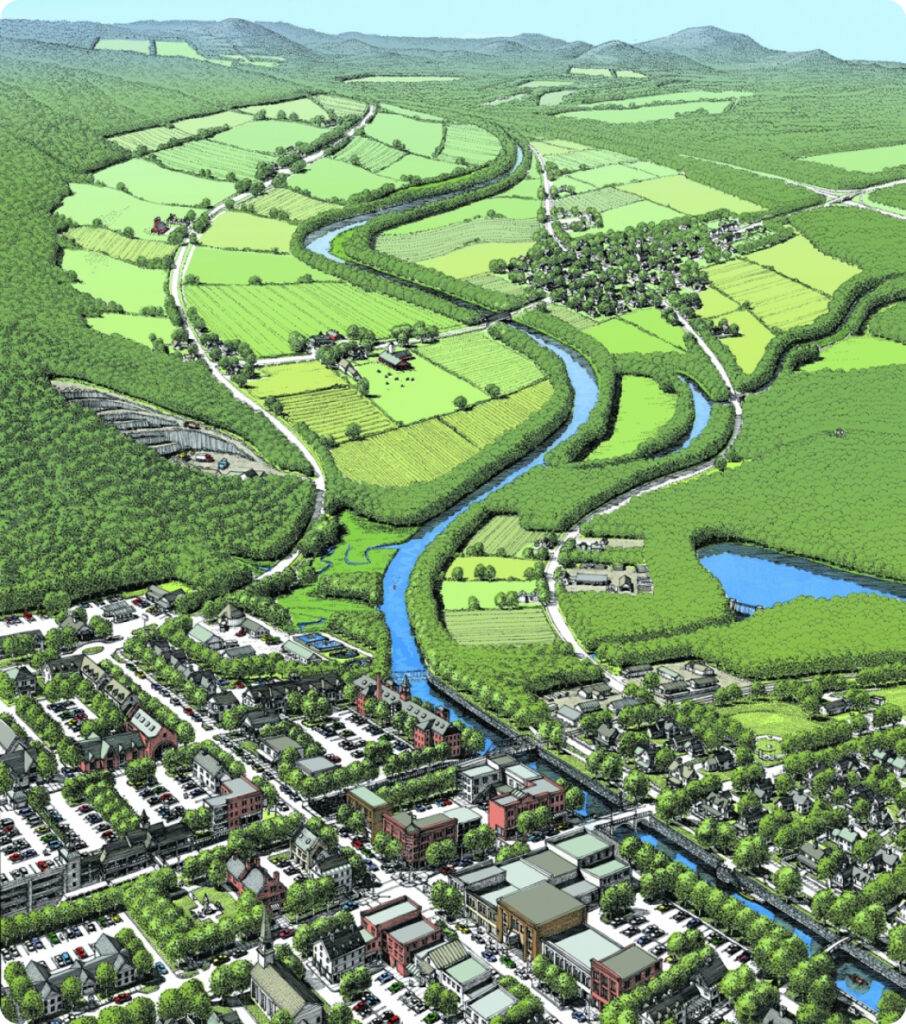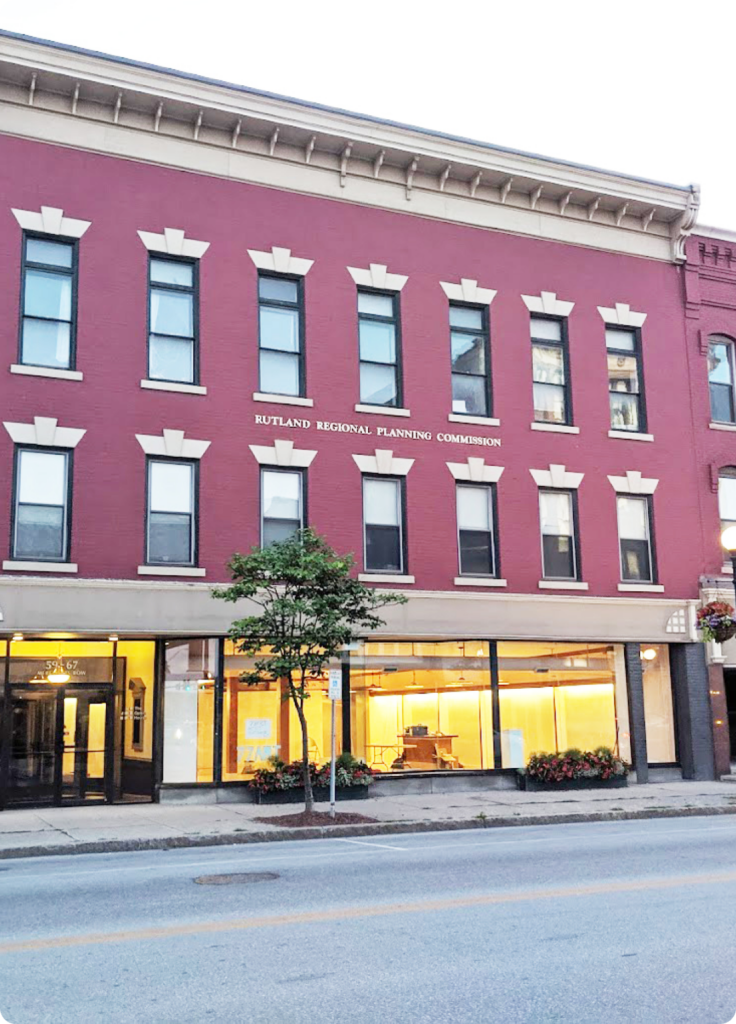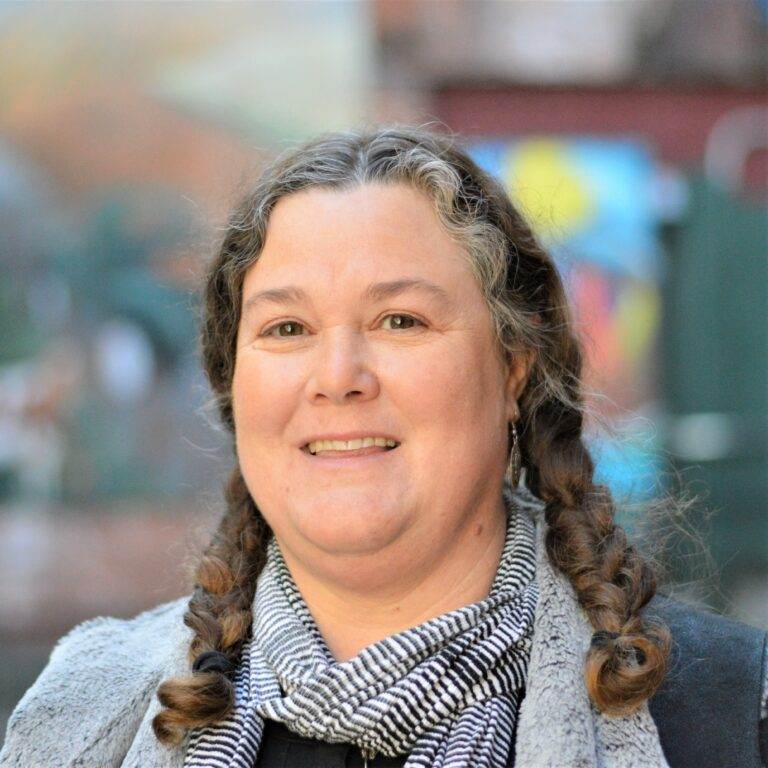
Our Mission is Making Rutland The Best Region In The Country
HELPING YOUR TOWN PLAN FOR THE NOW AND FOR THE FUTURE
Rutland Regional Planning Commission is a high-value, low-cost resource for communities.
Upholding the Vermont way of life on a human scale is important. We achieve this by hearing and balancing local desires; educating citizens and partners about land use practices; and by working with towns, developers, and local partners to ensure that the best practices are implemented.

Regional Planning Commission
One of eleven regional commissions serving Vermont municipalities. Officially, the RRPC is a non-taxing, political subdivision of the State of Vermont that operates under Title 24, Chapter 117, VSA. The Rutland Region is made up of 27 towns in Rutland County (minus Pittsfield).
The RRPC is governed by a Board of Commissioners with each of the 27 municipalities of the Rutland Region serving as the Commissioners (24 VSA §4342). Commissioners are appointed by local governments to serve on the Board and guide the work of the RRPC. The Board is governed by the RRPC Bylaws and meets monthly, along with standing committees; Community, Regional, and Transportation Advisory. For a full description of committes, list of commissioners, or meeting materials please visit our Boards & Committees page.
Promote cooperation amongst municipalities. Assist communities with creating and maintaining plans, studies, and bylaws. Prepare a regional plan that is consistent with state goals and is compatible with municipal plans. (24 VSA §4345a). Complete a scope of work as defined by an annual contract with ACCD to provide regional planning services. (24 VSA §4341a). Make recommendations on land development, urban renewal, economic development, urban beautification and design improvements, historic and scenic preservation. Gather economic and demographic information, and encourage the development and growth of small business (24 VSA §4345).
We strive for transparency
As a leader in open governance, the RRPC strives for transparency.
We make our financial and operating policies from our bylaws to budget available to the public for review. Annually, the RRPC Board of Commissioners approves the fiscal year budget and work plan and also approves any changes to bylaws, financial procedures, or the employee handbook.

Planning For Equity
The Rutland Regional Planning Commission (RRPC) celebrates diversity and welcomes all persons, regardless of race, color, religion, national origin, sex, gender identity or expression, sexual orientation, age, or disability. RRPC wants everyone to feel and be safe and welcome in the communities we serve. We formally condemn racism and discrimination in all its forms and commit to fair and equitable treatment of everyone in our communities. RRPC strives to ensure all our actions, policies, and operating procedures reflect this commitment. RRPC has and will continue to support its member communities as places where all individuals can live freely, express their opinions, and feel a sense of belonging.
Adopted by RRPC Board of Commissioners on this 15th day of November 2022.
The Rutland Regional Planning Commission (RRPC) receives federal funding to support a number of planning programs, including transportation, brownfields, Vermont Community Development Program/CDBG, HUD Sustainable Communities, hazard mitigation planning and other projects. As a sub-recipient of such funding, this organization is subject to State and Federal rules and regulations that prohibit discrimination in all activities, whether federally funded or not.
Title VI of the Civil Rights Act of 1964, the Civil Rights Restoration Act of 1987, and related Federal and State statutes and regulations, prohibits discrimination and provides that no person in the United States shall, on the grounds of race, color, national origin, gender, age, low income status, mental or physical disability, or persons with limited English proficiency (LEP) be excluded from participation in, be denied the benefits of, or be subjected to discrimination under any program or activity receiving federal financial assistance.
A key element for addressing Title VI at the planning phase is having an effective public involvement process. That process must be proactive and provides complete information, timely public notice, full public access to key decisions and an opportunity for early and continuing involvement. A public involvement process should also include a process for seeking out and considering the needs of those who are traditionally ignored or underserved (e.g. by existing transportation systems).
It is the policy of the Rutland Regional Planning Commission (RRPC) to uphold and assure full compliance with Title VI of the Civil Rights Act of 1964, the Civil Rights Restoration Act of 1987, the Federal Aid Highway Act of 1973, Age Discrimination Act of 1975, the Americans with Disabilities Act of 1990, Section 504 of the Rehabilitation Act of 1973, Executive Order 12898 and Executive Order 13166, and related federal and state statutes and regulations. Title VI prohibits discrimination in federally assisted programs and requires that no person in the United States of America shall, on the grounds of race, color, national origin, gender, age, persons with limited English proficiency (LEP) or mental or physical disability be excluded from participation in, be denied the benefits of, or be otherwise subjected to discrimination under any program or activity receiving federal assistance.
Complaint Procedures
Any person who believes that he or she, individually, or as a member of any specific class of persons, has been subjected to discrimination on the basis of race, color, national origin, gender, age, or mental or physical disability, may file a complaint with the Rutland Regional Planning Commission (RRPC).
The mailing address for written complaints is as follows:
Mary Kay Skaza, Title VI Coordinator
Rutland Regional Planning Commission
P.O. Box 430
Rutland, VT 05702
Complaints may also be submitted by telephone or fax. Contact numbers are as follows:
Phone: (802) 775-0871
Fax: (802) 775-1766
Electronic submission of complaints is also permitted. All complaints related to Title VI discrimination should be addressed to Mary Kay Skaza, Title VI Coordinator, at the following address: [email protected]
Devon Neary
Devon continues the legacy of collaborative planning aimed at creating strong local economies and vibrant communities in the Rutland Region.
Devon helps grow and lead the RRPC by keeping the focus on Towns while supporting the top-notch regional planning staff of the RRPC. Devon brings a unique local perspective, having grown up in Rutland County, which motivates him to help towns realize and achieve their goals. Devon holds a bachelor’s degree in Environmental Science from Castleton University, a master’s degree in Environmental Law and Policy from Vermont Law School, and a certificate in Livable Communities and Sustainable Transportation from University of Washington. Devon serves as the Chair of the Vermont Association of Planning and Development Agencies (VAPDA) and the Marble Valley Regional Transit District (MVRTD).

Special Projects and Programs
Putting The Passion and Expertise To Work

Barbara Noyes Pulling, CFM
Barbara is our resident natural resources and water quality expert. Barbara, in partnership with the Poultney Mettowee Natural Resources Conservation District, leads the South Lake Champlain Clean Water Service Provider (CWSP) to develop and implement local and regional projects that improve our precious water resources.

Maggie O'Brien
Maggie is outgoing, organized, and dedicated to her work as Emergency Management Planner. She helps Towns prepare, respond, and recover from natural disasters. You can often find Maggie leading her local EMDs with fun and engaging roundtables and trainings, as she cultivates regional collaboration.

Jeremy Gildrien
Jeremy is electric as our regional energy planner! Jeremy works directly with Towns that take an active role in energy planning by assisting with Enhanced Energy Plans. Jeremy also helps Towns become more energy efficient through the Municipal Energy Resilience Program (MERP), helping to save money and the planet!

Logan Solomon
Logan is every town planning commissions ‘best friend’ as he provides technical assistance for town planning and zoning. When Logan is not visiting a local planning commission, he is leading our regional housing planning program to help develop affordable and accessible housing for all!





